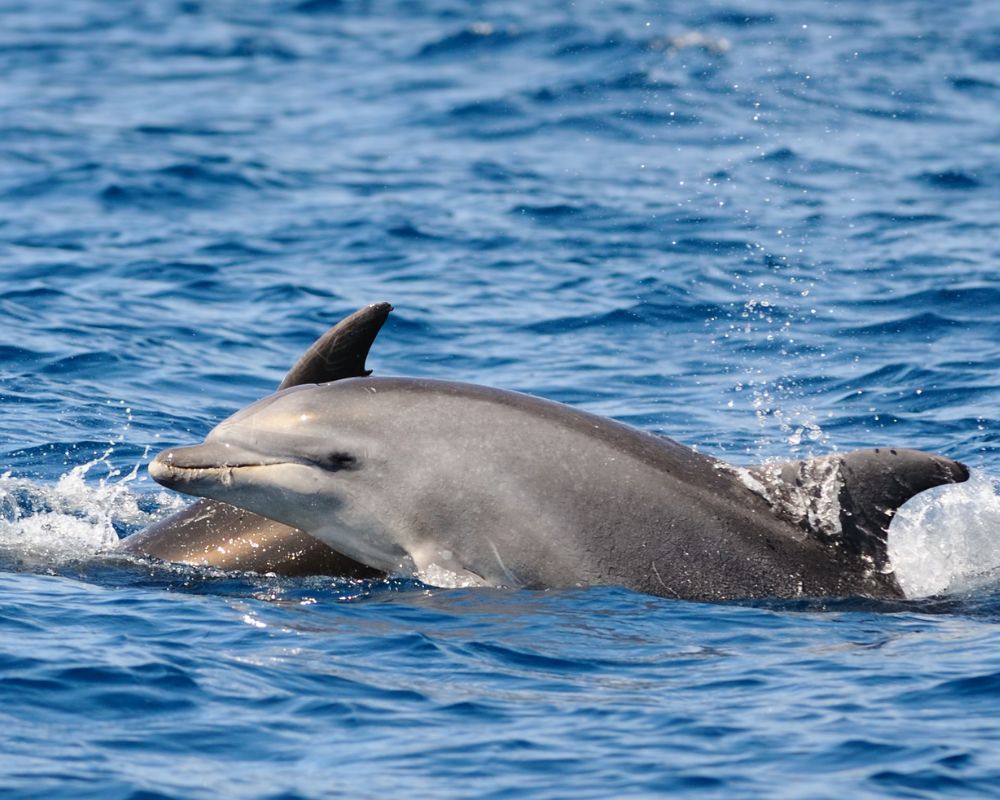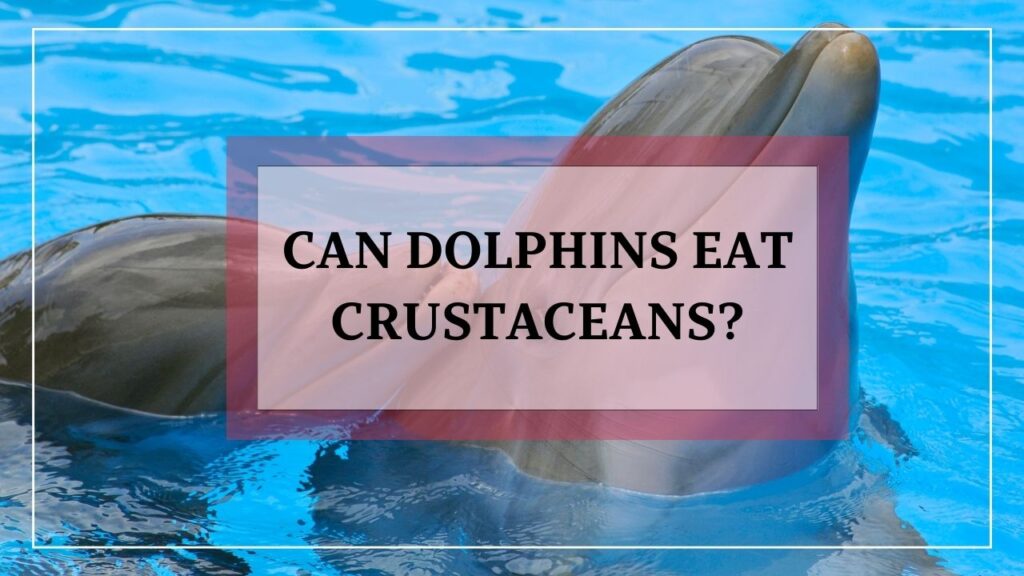Have you ever seen a dolphin in the wild and wondered what they eat? Maybe you’ve pictured them munching on a fish or squid, but did you know that they also eat crustaceans? It’s true! Dolphins have a diverse diet, and they’re not afraid to try new things.
As someone who’s always been fascinated by marine life, I’m constantly learning new things about the animals that call the ocean their home. Dolphins are some of the most intelligent and curious creatures out there, and their diet is just as interesting as their personalities.
Now, you might be thinking, “Hold on a minute, can dolphins really eat crustaceans?” And the answer is yes, they can! But not all crustaceans are safe for dolphins to eat, and some can even be harmful.
So, let’s dive into the world of dolphins and their diet, and find out what types of crustaceans they can eat and how it affects their health. Get ready to learn something new and exciting about these amazing creatures!
Can Dolphins Eat Crustaceans?

If you’re wondering whether dolphins can eat crustaceans, the answer is a resounding “Yes!” Dolphins are known for their varied diet, which includes fish, squid, and crustaceans. But how do they eat them, and what types of crustaceans can they consume? Let’s find out.
How Dolphins Eat Crustaceans?
Dolphins have teeth designed to catch and hold onto slippery prey like fish and squid. But when it comes to crustaceans, they have to work a little harder. Dolphins use their teeth to crush the hard shells of crustaceans, like shrimp, crabs, and lobsters, before consuming them.
It’s quite a sight to see a dolphin chomping down on a lobster, but they’re more than capable of doing so! And because dolphins have such strong jaws, they can crush through even the toughest shells.
Types Of Crustaceans Dolphins Can Eat
Dolphins can eat a wide range of crustaceans, including shrimp, crabs, and lobsters. They have a varied diet, and they’re not afraid to try new things.
However, it’s important to note that not all crustaceans are safe for dolphins to eat. Some types can be toxic or harmful to their health, so it’s essential for dolphins to be selective in what they consume.
Here is some information about the most common crustaceans eaten by dolphins:
- Shrimp: Shrimp is one of the most common crustaceans in a dolphin’s diet. They’re small and easy to catch, and their shells are relatively thin, making them easy for dolphins to crush with their teeth. Shrimp are also high in protein and other nutrients, making them a nutritious food source for dolphins.[1]
- Crab: Crabs are another common type of crustacean that dolphins eat. They have harder shells than shrimp, but dolphins are able to crush them with their strong jaws. Crabs can be a bit trickier to catch, but dolphins are known for their agility and speed in the water.
- Lobster: Lobsters are one of the larger crustaceans that dolphins eat, and they can be quite a challenge to catch. Their shells are thick and hard, but dolphins are able to use their teeth to crack them open. Lobsters are a rich source of protein and other nutrients, making them a valuable food source for dolphins.
- Other Crustaceans: While shrimp, crab, and lobster are some of the most common types of crustaceans that dolphins eat, they’re not the only ones. Dolphins have been known to consume other types of crustaceans, including krill, barnacles, and even mantis shrimp. As long as the crustacean is safe for them to eat, dolphins are open to trying new things.
How Dolphins Digest Crustaceans?
Dolphins have a unique digestive system that allows them to break down and digest the tough shells of crustaceans. Their stomachs contain a special enzyme called protease, which helps break down the proteins found in the shells. This allows the dolphin’s body to absorb the nutrients from the crustacean, including calcium and protein.
Benefits of Crustaceans in a Dolphin’s Diet
Dolphins need a varied and nutritious diet to stay healthy, and crustaceans can be a valuable addition to their menu. Here are some of the benefits of including crustaceans in a dolphin’s diet:
1. Rich in Essential Nutrients
Crustaceans are a rich source of protein, calcium, and other essential nutrients that are necessary for the growth and development of dolphins. Protein is especially important for dolphins, as it’s essential for building and repairing muscle tissue.
Calcium is also crucial for the development of strong bones and teeth, which is essential for a dolphin’s survival in the wild.
2. Boosts Immune System
Eating crustaceans can help maintain a dolphin’s immune system, which is important for fighting off diseases and infections.
Crustaceans are rich in antioxidants, which can help reduce oxidative stress and inflammation in the body. This can help protect the dolphin’s cells from damage and promote overall health.
3. Promotes Healthy Growth and Development
Dolphins need a balanced diet to support their growth and development, and crustaceans can play an important role in this process.
The nutrients found in crustaceans can help support healthy bone and muscle growth, which is important for a dolphin’s overall fitness and survival in the wild.
4. Improves Overall Health
By including crustaceans in their diet, dolphins can improve their overall health and well-being. Crustaceans are a nutrient-dense food source that can help provide the energy and nutrition dolphins need to thrive in their environment.
Eating a balanced diet that includes crustaceans can help dolphins maintain optimal health and increase their chances of survival in the wild.
Risks of feeding dolphins crustaceans
You may be wondering, “If crustaceans are so beneficial for dolphins, why shouldn’t we feed them?” Well, my friend, there are some risks associated with feeding dolphins crustaceans.
Exposure to toxins is one of the biggest concerns when it comes to feeding dolphins and crustaceans. Heavy metals and harmful chemicals can accumulate in the shells of crustaceans, and consuming contaminated crustaceans can be detrimental to the health of dolphins.
Contaminated crustaceans can lead to various health problems in dolphins, including reproductive issues, immune system problems, and neurological disorders. This is why it’s important to make sure that the crustaceans you feed to dolphins are free from contaminants and safe for consumption.
It’s also important to note that feeding wild dolphins is generally discouraged as it can disrupt their natural feeding patterns and cause them to become dependent on humans for food. Feeding dolphins can also lead to unsafe behaviors, such as begging for food from boats or approaching humans too closely.
In summary, while crustaceans can provide many benefits to a dolphin’s diet, it’s important to ensure that they are free from toxins and that feeding wild dolphins is avoided to maintain their natural behaviors and health.

